- Home
- P. D. James
A Certain Justice Page 2
A Certain Justice Read online
Page 2
She had spent the evening from seven o’clock having supper and then watching a video of The Sound of Music with a friend, Mrs. Pierce, who lived five doors down the road. She didn’t herself have a video recorder but her friend would hire a video each week, and usually invited her to spend the evening so that they could watch it together. She didn’t normally leave the house at night but Mrs. Pierce lived so close that she didn’t mind walking the short distance home and the road was well lit. She was certain of the time. When the film ended both she and her friend had said how much later it was than either of them had expected. The clock on her friend’s mantelpiece had shown ten minutes past eleven and she had looked at her own watch because of her surprise that the time had passed so quickly. She had known Garry Ashe since he had come to live with his aunt. She had no doubt that it was he whom she had seen leaving Number 397. He had walked swiftly down the short garden path and had turned left on Westway, walking quickly away from her. She had stood watching him until he was out of sight, surprised that he was leaving the house so late. She had then let herself into Number 396. She couldn’t remember whether there were any lights showing from the house next door. She rather thought that it had been in darkness.
It was towards the end of Rufus’s examination-in-chief that the note was passed to Venetia. Ashe must have signalled to his solicitor, who went over to the dock. The note was handed from him to Venetia. It was written in a black ballpoint in a firm, small, upright hand. There was nothing impulsive or scrawled about this message. “Ask her what spectacles she was wearing on the night of the murder.”
Venetia was careful not to look at the dock. It was, she knew, one of those moments of decision which could decide the outcome of the trial. And it went straight to that first rule of cross-examination learned when she was a pupil: never ask a question unless you already know the answer. She had five seconds to decide before she must rise to cross-examine. If she asked this question and the answer was wrong, Ashe would go down. But she was confident of two things. The first was that she did already know the answer; Ashe would not have written that note unless he was certain. The second was as vital. She had, if at all possible, to discredit Mrs. Scully. The woman’s evidence, given with such obvious honesty, such certainty, had been damning.
She slipped the note under her papers as if it were an unimportant matter which she could attend to at leisure and took her time getting to her feet.
“Can you hear me clearly, Mrs. Scully?”
The woman nodded and whispered “Yes.” Venetia smiled at her briefly. It was enough. The question, the encouraging smile, the warmth of the voice said it all: I’m a woman. We’re on the same side. These pompous men don’t frighten us. You’ve nothing to fear from me.
Venetia went over the evidence quietly so that when she was ready to move in for the kill the victim was happily compliant. The rows she had heard from next door, one male voice, the other, strongly Irish, recognizably that of Mrs. O’Keefe. Mrs. Scully had thought it had been the same male voice each time. But Mrs. O’Keefe was always entertaining her men friends. Perhaps a more accurate word would be “clients.” Could she be certain that the voice was Garry’s? Mrs. Scully could not be sure. The suggestion was skilfully planted that a natural animus against the aunt could have spilled over to include the nephew. They were not the kind of neighbours Mrs. Scully was used to.
“We come now, Mrs. Scully, to your identification of the defendant as the young man you saw leaving Number 397 on the night of the murder. Did you often see Garry leaving the house by the front door?”
“No, he usually used the back door and the garden gate because of his motorbike.”
“So you would see him leaving, wheeling his bike out by the garden gate?”
“Sometimes. I could see from my bedroom window at the back.”
“And as he kept his motorcycle in the garden, then that would be the natural way for him to leave?”
“I suppose so.”
“Did you sometimes see him leaving by the back gate even when he hadn’t the bike with him?”
“Once or twice, I suppose.”
“Once or twice in all, or once or twice a week? Don’t worry if you can’t be absolutely precise. It isn’t, after all, something you’d make a note of.”
“I suppose I saw him leaving by the back door about two or three times a week. Sometimes with his bike, sometimes not.”
“How often did you see him leaving by the front door?”
“I can’t remember. Once when he had a taxi call for him. He left by the front door then.”
“As one would expect. But did you often see him use the front door? You see, what I’m trying to find out here, because I think it will help the jury, is whether Garry normally used the front door or the back door when he left the house.”
“I think they mostly used the back door, both of them.”
“I see. They mostly used the back door.” Then, still quietly, still in the same interested, sympathetic voice: “The spectacles you are wearing today, Mrs. Scully, are they new?”
The woman put up her hands to the frames as if uncertain that she was still wearing them. “Quite new. I got them on my birthday.”
“Which was?”
“February 16th. That’s how I remember.”
“And you are quite sure about the date?”
“Oh yes.” She turned to the judge as if anxious to explain. “I was going to have tea with my sister and I went into the shop to collect them on the way. I wanted to know what she thought about the new frames.”
“And you are quite sure of the date, February 16th—five weeks after the murder of Mrs. O’Keefe?”
“Yes, quite sure.”
“Did your sister think that the new glasses suited you?”
“She thought they were a bit fancy, but I wanted a change. You get tired of the same old frames. I thought I’d try something different.”
And now the dangerous question, but Venetia knew what the answer would be. Women who are struggling on a low income don’t pay for an eye test unnecessarily or see their spectacles as a fashion accessory.
She asked: “Is that why you changed the spectacles, Mrs. Scully? Because you wanted to try different frames?”
“No, it wasn’t. I couldn’t see properly with the old spectacles. That’s why I went to the oculist.”
“What couldn’t you see specifically?”
“Well, the television really. It was getting so that I couldn’t see the faces.”
“Where do you watch the television, Mrs. Scully?”
“In the front sitting-room.”
“Which is the same size as the one next door?”
“It must be. The houses are all alike.”
“Not a large room, then. The jury have seen photographs of Mrs. O’Keefe’s front room. About twelve feet square, would you say?”
“Yes, I suppose so. About that.”
“And how far do you sit from the screen?”
The first sign of slight distress, an anxious look at the judge, then she said: “Well, I sit by the gas fire, and the telly’s in the opposite corner, by the door.”
“It’s never comfortable to have the screen too close, is it? But let’s see if we can be more definite.” She looked at the judge, “If I may, my Lord,” and received his confirming nod. Then she leaned forward to Ashe’s solicitor, Neville Saunders. “If I ask this gentleman to move slowly towards his Lordship, will you tell me when the distance between them is roughly the same as the distance between you and the set?”
Neville Saunders, a little surprised but setting his features into the gravity appropriate to taking a more active part in the proceedings, got up from his seat and began his slow game of grandmother’s footsteps. When he was ten feet from the bench, Mrs. Scully nodded. “About there.”
“Ten feet or a little less.”
She turned again to the witness. “Mrs. Scully, I know that you are an honest witness. You are trying to tell the truth t
o help the court and you know how important that truth is. The freedom, the whole future of a young life depends on it. You have told the court that you couldn’t comfortably see your television set at ten feet. You have stated on oath that you recognized the defendant at twenty feet on a dark night and by the light of overhead street lighting. Can you be absolutely sure that you weren’t mistaken? Can you be confident that it wasn’t some other young man leaving the house that night, someone of roughly the same age and the same height? Take your time, Mrs. Scully. Think back. There’s no hurry.”
There were only eight words the witness needed to speak: “It was Garry Ashe. I saw him plainly.” A professional criminal would have said them, would have known that in cross-examination you stick to your story doggedly, without alteration, without embellishment. But professional criminals know the system; Mrs. Scully was under the disadvantage of honesty, of nervousness, of the wish to please. There was a silence, then she said: “I thought it was Garry.”
To leave it there or to go one step further? This was always the danger in cross-examination. Venetia said: “Because it was his house, he lived there. You would expect it to be Garry. But could you really see plainly, Mrs. Scully? Can you be sure?”
The woman stared at her. At last she said: “I suppose it could have been someone like him. But I thought at the time it was Garry.”
“You thought at the time it was Garry, but it could have been someone like him. Precisely. It was a natural mistake, Mrs. Scully, but I suggest to you that it was a mistake. Thank you.”
Rufus, of course, could not leave it like that. Entitled to reexamine on a point requiring clarification, he got portentously to his feet, hitched up his gown and surveyed the air above the witness box with the puzzled frown of a man expecting a change in the weather. Mrs. Scully looked at him with the anxiety of a guilty child who knows that she has disappointed the grown-ups. Rufus attempted with some success to modify his tone.
“Mrs. Scully, I am sorry to keep you but there is one point on which I think that the jury may be somewhat confused. During your examination-in-chief you said that you had no doubt that it was Garry Ashe whom you saw leaving his aunt’s house at a quarter past eleven on the night of the murder. However, during cross-examination by my learned friend you have said—and I quote—’I suppose it could have been someone like him. But I thought at the time it was Garry.’ Now, I’m sure you will realize that these two statements can’t both be right. The jury may find it difficult to understand what precisely it is you are saying. I confess I find myself somewhat confused. So I have just the one question. The man you saw leaving Number 397 that night, who do you believe he was?”
And now she was anxious only to be let out of the witness box, no longer to feel that she was being pulled between two people who both wanted a clear answer from her, but not the same answer. She looked at the judge, as if hoping that he would answer for her, or at least help her to a decision. The court waited. Then the answer came and it came with the desperation of truth.
“I believe that it was Garry Ashe.”
Venetia knew that Rufus had little choice but to call his next witness, Mrs. Rose Pierce, to confirm the time at which Mrs. Scully had left her house. Time was of the essence. If Mrs. O’Keefe had been killed immediately or shortly after arriving home from the pub, Ashe would have had thirty minutes in which to kill, shower, dress and set out on his walk.
Mrs. Pierce, plump, red-cheeked, bright-eyed and padded in a black woollen coat topped with a flat hat, fitted comfortably into the witness box like Mrs. Noah ensconced in the cabin of her ark. No doubt, thought Venetia, there were places which Mrs. Pierce might find intimidating but the premier court at the Old Bailey was not among them. She gave her profession as retired children’s nurse, “A nanny, my Lord,” and gave the impression that she was as capable of dealing with the adult nonsenses of the male sex as she had been with their childhood delinquencies. Even Rufus, facing her, seemed to be visited by uncomfortable memories of nursery discipline. His examination was brief and her answers were confident. Mrs. Scully had left her house just before Mrs. Pierce’s carriage clock, given to her by one of her employers, had chimed quarter past eleven.
Venetia rose at once to ask her single question.
“Mrs. Pierce, can you remember whether Mrs. Scully complained that she had difficulty in seeing the video that evening?”
Mrs. Pierce was surprised into unexpected loquacity.
“Funny you should ask that, learned counsel madam. Dorothy complained at the time that the picture wasn’t clear. Mind you, that was when she had her old specs. She’d been saying for some time that she ought to have her eyes tested and I told her the sooner the better and we had a chat over whether she’d stick to the same frames or try something different. Try something new, I told her. Be a devil. You only live once. Well, she got the new specs on her birthday and she’s had no trouble since.”
Venetia thanked her and sat down. She felt a little sorry for Rufus. The night of the murder could so easily have been the one on which Mrs. Scully had made no complaint of poor sight. But only the most naïve believed that luck played no part in the criminal-justice system.
On the next day, Thursday, 12 September, Venetia stood up to open the case for the defence. She had already effectively made that case in her cross-examination. Now, by the early afternoon, she had only one witness left to call: the accused.
She knew that she had to put Ashe in the box. He would have insisted. She had recognized early in their professional relationship the vanity, the mixture of conceit and bravado, which might even now undo all the good achieved by her cross-examination of the Crown witnesses. He wasn’t going to be cheated out of this final public performance. All those hours of sitting patiently in the dock were for him a prelude to the moment when at last he could answer for himself and the case would be won or lost. She knew him well enough to be sure that what he had most hated was the knowledge that he had to sit while others spoke, others argued their case. He was the most important person in that courtroom. It was for him that a High Court judge in his scarlet robe sat to the right of the carved royal arms, for him that twelve men and women sat there listening patiently for hour after hour, for him that the distinguished members of the Bar in their wigs and gowns questioned, cross-questioned and argued. Venetia knew that it was easy for the accused to feel that he was merely the ineffectual object of others’ concerns, that the system had taken him over, was using him, that he was on display so that others could demonstrate their cleverness, their expertise. Now he would have his chance. She knew that it was a risk; if the conceit, the bravado proved stronger than his control then they were in trouble.
Within minutes of her examination-in-chief she knew that she needn’t have worried. His performance—and she had no doubt that it was that—was beautifully judged. He was, of course, prepared for her first question, but she had not been prepared for his answer.
“Garry, did you love your aunt?”
A short pause, and then: “I was very fond of her, and I was sorry for her. I don’t think I know what people mean by love.”
They were the first words he had spoken in court except for that plea of not guilty spoken in a firm low voice. The court was absolutely silent. The words fell on the quiet expectant air. Venetia could sense the reaction of the jury. Of course he didn’t know, how could he? A boy who had never known his father, had been thrown out by his mother before he was eight, been taken into care, shunted from foster parent to foster parent, transferred from one children’s home to another, seen as a nuisance from the moment he was born. He had never known tenderness, security or disinterested affection. How could he know the meaning of love?
She had an extraordinary sense during his examination of their working together like two actors who had played opposite each other for years, recognizing each other’s signals, judging each pause for its effectiveness, being careful not to spoil the other’s most powerful moment, not because of affection
or even mutual respect, but because this was a double act and its success depended on that instinctive understanding in which each contributed to the desired end. His story had the merit of consistency and simplicity. What he had first said to the police he now told the court without alteration or embellishment.
Yes, his aunt and he had had a disagreement while they were at the Duke of Clarence. It had been a resurgence of the old argument: she wanted him to go on taking photographs of her when she and her customers were having sex, he wanted to stop. It had been a disagreement rather than a violent quarrel, but she had been drunk and he had thought it wise to get away, to walk alone through the night to think out whether it was time for him to move on.
“And is that what you wanted, to leave your aunt?”
“Part of me wanted that, part of me wanted to stay. I was fond of her. I think she did need me, and it was home.”
So he had walked through the streets behind Westway as far as Shepherd’s Bush before returning. There were people passing, but not many. He had noticed no one in particular. He wasn’t even sure which streets he had walked. He had arrived home just after midnight to find his aunt’s body lying on the single divan in the sitting-room and had at once telephoned the police. No, he had not touched the body. He could see as soon as he entered the room that she was dead.
He was unshaken in cross-examination, ready to say in reply to questions that he could not remember or was not sure. He never once looked at the jury, but they in their box to the right of him kept their eyes on him. When he finally left the witness box she wondered why she had ever doubted him.
Her final speech for the defence took each of the prosecution’s points one by one and persuasively demolished them. She spoke to the jury as if she were confiding to them the truth of a matter which, with good reason, had caused both them and her concern, but which could now be seen in its true, its reasonable, its essentially innocent light. Where was his motive? It had been suggested that he hoped to be his aunt’s heir, but all Mrs. O’Keefe had in prospect was the money for the compulsory sale of her house, when it came through, and that was insufficient to cover her debts. Her nephew knew that she spent lavishly, particularly on drink, that her creditors were pressing, that debt-collectors called at the house. What could he expect to receive? By her death he had gained nothing and lost a home. Then there was that single small splash of Mrs. O’Keefe’s blood on the head of the shower and the two spots on the stairs. It had been suggested that Ashe had killed his aunt naked and had showered before leaving the house to take a walk designed to provide an alibi. But a visitor, particularly if he were a regular client, would have known the house, known that the tap of the bathroom washbasin was stiff and gave an uncertain flow of water. What more natural than that he should wash his bloody hands under the shower?

 The Skull Beneath the Skin
The Skull Beneath the Skin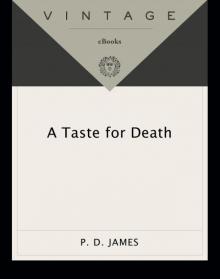 A Taste for Death
A Taste for Death The Children of Men
The Children of Men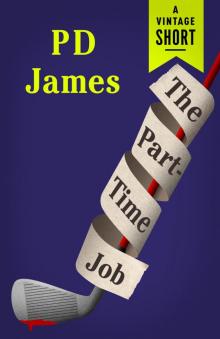 The Part-Time Job
The Part-Time Job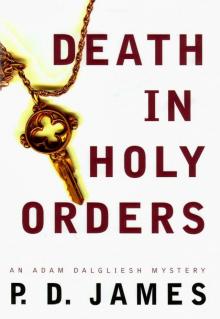 Death in Holy Orders
Death in Holy Orders The Victim
The Victim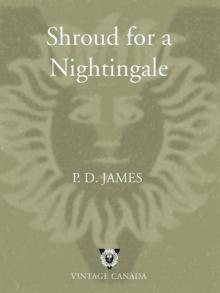 Shroud for a Nightingale
Shroud for a Nightingale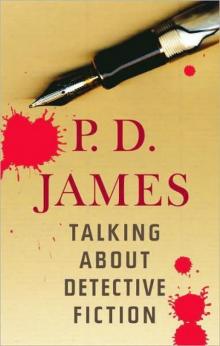 Talking about Detective Fiction
Talking about Detective Fiction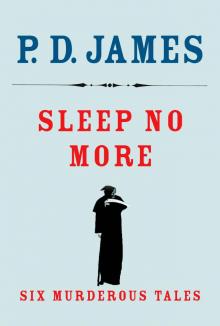 Sleep No More
Sleep No More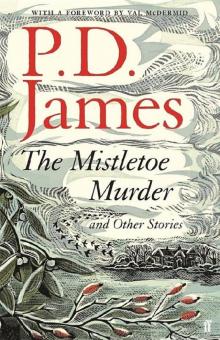 The Mistletoe Murder and Other Stories
The Mistletoe Murder and Other Stories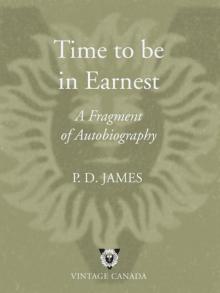 Time to Be in Earnest
Time to Be in Earnest Original Sin
Original Sin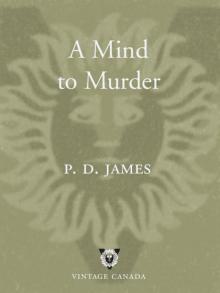 A Mind to Murder
A Mind to Murder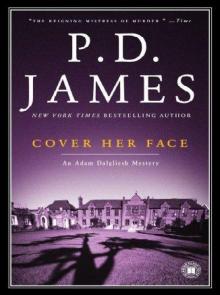 Cover Her Face
Cover Her Face Innocent Blood
Innocent Blood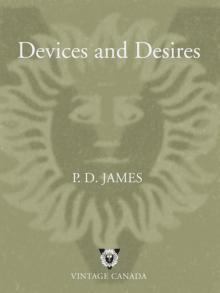 Devices and Desires
Devices and Desires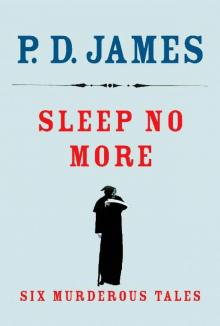 Sleep No More: Six Murderous Tales
Sleep No More: Six Murderous Tales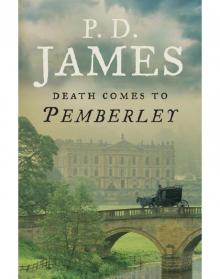 Death Comes to Pemberley
Death Comes to Pemberley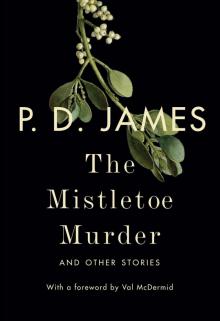 The Mistletoe Murder
The Mistletoe Murder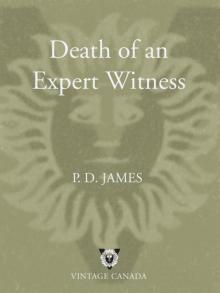 Death of an Expert Witness
Death of an Expert Witness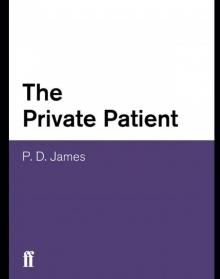 The Private Patient
The Private Patient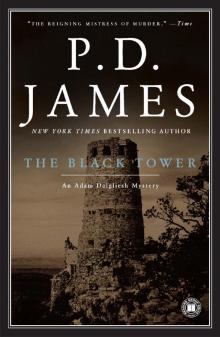 The Black Tower
The Black Tower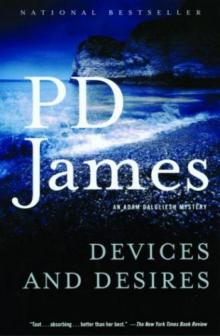 Devices & Desires - Dalgleish 08
Devices & Desires - Dalgleish 08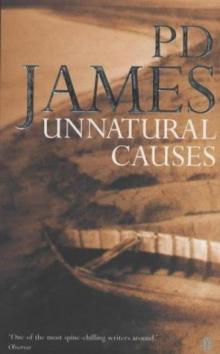 Unnatural Causes
Unnatural Causes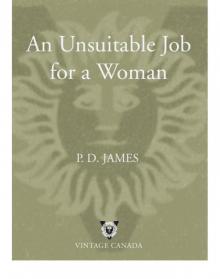 An Unsuitable Job for a Woman
An Unsuitable Job for a Woman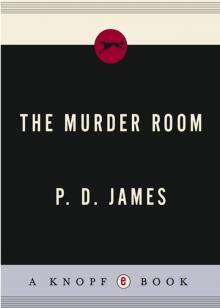 The Murder Room
The Murder Room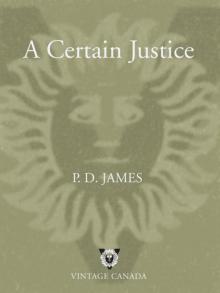 A Certain Justice
A Certain Justice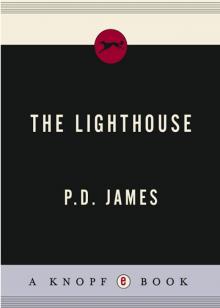 The Lighthouse
The Lighthouse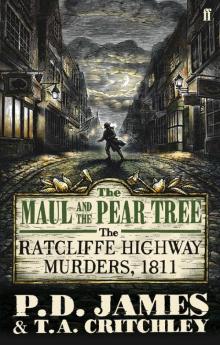 The Maul and the Pear Tree
The Maul and the Pear Tree